Just as we’re moving from one side of the ground to the other, South Melbourne score. For the 20 seconds or so we lose sight of the pitch, venturing behind the hoardings beneath the southern end scoreboard, Hellas go one up against old rivals Heidelberg United.
We could hear the Hellas fans cheer. We had been sitting on the same side as the Heidelberg fans, at the bottom of the old stand painted in the home team’s yellow and black. We were at the very foot of the concrete terracing on the scrubby grass, sitting in the hot afternoon sun. I had looked around for a ramp, a forgiving slope that I might have been able to push my dad’s wheelchair up in order to escape the afternoon heat, but to no avail. We headed instead to a shady spot on the other side of the ground on a small hill overlooking the south-west corner flag.
I am still getting used to pushing a wheelchair and my dad is still getting used to being in one, and the trip along the dirt path was a little rough in sections. (In retrospect, I don’t know why I didn’t just make use of the running track around the pitch. But the whole wheelchair thing sort of throws you in the beginning and you’re not sure exactly where you can or can’t go.)
It was the sun that had put him in the wheelchair. He had been in his backyard, gardening on a 35-degree day – as 80-year-old men do – when he had a minor heart attack and collapsed. He was unconscious and lying in the sun for a few hours, the pale skin on his legs exposed to the scorching UV when we found him that afternoon.
My wife, an experienced trauma nurse, was ashen-faced as she took his vital signs and tried to ascertain the best course of action before the paramedics arrived. When they arrived they took me aside and asked in a hushed tone about my father’s “wishes” in regard to resuscitation. His temperature was 42-degrees and he was suffering heat stroke. We were worried the heat had cooked his brain and body beyond recovery.
Three months of hospitalization and several skin grafts later, he was now in a nursing home. Parts of his legs had been burned so badly that flesh had to be scooped away almost to the bone. This is why he is now in a wheelchair. There’s hope with rehab he won’t be in the chair forever. But at his age, life no longer hands out guarantees.
He had been living independently at home but had been showing increasing signs of frailty. His walking pace had slowed considerably and he had become ever more doddery. Despite this he still managed to get out regularly to watch his local team, Dandenong Thunder, who play in the Victorian NPL. On most Sundays during the season he also caught the bus and train to Richmond, where we’d pick him up and take him out to watch his grandson — my nephew — playing juniors. At home, he’d watch the football on Foxtel almost around the clock.
The time in hospital had been like football cold turkey for him. We would try to make sure to visit him on Friday nights to watch the live A-League match on SBS together, as a family. No Foxtel in hospital. It was a brief reprieve from the tedium of hospital life.
Wheeling him around the ground, we got stuck for a second in a patch of dirt. This is when Hellas scored. I jerked and pushed the chair around a bit to loosen the wheels from the dirt. Finally we made it to the hill and I pushed the chair up to the hilltop where it was shady and the view wasn’t too bad – though the running track made the game feel too far away.
I think my dad had last been to Heidelberg’s Olympic Village ground about five years ago for a Dandenong Thunder match. The people at Thunder had always looked after him and club officials and fans often offered him lifts to away matches. The last time I had been to Olympic Village was maybe 25 years ago, when I was still young and playing. The world has changed a lot in that time, but Olympic Village seemed the same.
I nervously kept checking the brakes on the wheelchair. All I could imagine was my dad rolling down the hill like he was a stunt dummy in an old black and white film. You know, like Laurel & Hardy or Abbott & Costello.
Two men were sitting on the hill a couple of metres in front of us. The older man turned around and asked, “Is that a Fradi shirt?”
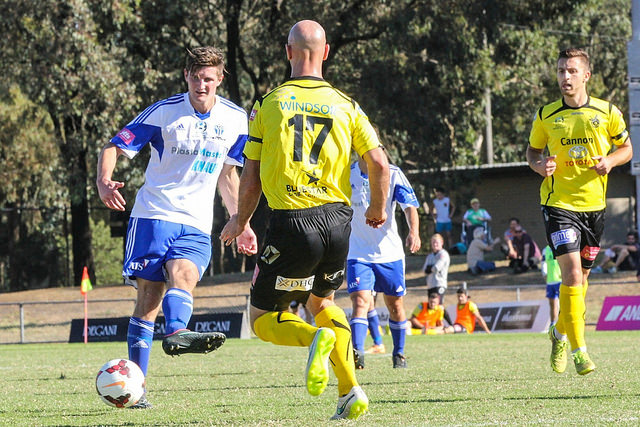
“Is that a Fradi shirt?” Mr Schmidl, in his green Ferencváros shirt, under the shade of a eucalyptus tree, watches the action on the field from his wheelchair. Photo: Cindy Nitsos
My dad was wearing a green Ferencváros shirt — his favourite Hungarian football team. We had bought the shirt at the club’s souvenir shop on a last hurrah trip back to Hungary a few years ago. We had gone along to a cup match Ferencváros were playing against a fairly undistinguished provincial town team, DVTK of Miskolc, and managed to see half a game before the Fradi fans basically rioted in protest against the club’s English owners and management and the game was called off. My dad had waited about three decades to see the club he loves play again, flew halfway around the world, and this is what happens.
“Are you Hungarian?”
I immediately recognised the lilt of the Hungarian accent, even though it was not especially strong.
On top of everything else my dad has had a couple of strokes, so his cognition isn’t all that great. He knows what people are saying and he knows what he wants to say, but it comes out jumbled.
“Yes, yes Fradi!” he responded, pointing to the crest on his shirt excitedly as if he had just scored the winning goal in a Budapest derby against old rivals MTK.
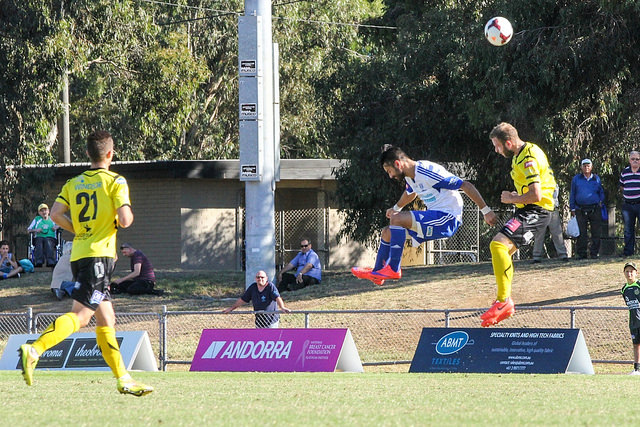
“Yes, yes Fradi!” Mr Schmidl confirms the provenance of the Ferencváros shirt as he observes an aerial duel on the pitch. Photo: Cindy Nitsos
As is often the way at football matches, we struck up a conversation. My dad taking part when he could, interjecting occasionally when the right words floated into his brain at the right time – like Hidegkuti making a perfectly timed slide rule pass to Puskas.
One of the most heartbreaking things about the past few months has been the empty, dejected look on my dad’s face when he has been, understandably, overwhelmed by the hours, days, weeks, months of incarceration in a hospital bed. So to see him come alive, to see the sparks fly in his eyes, as we talked to this man and his son about football was nourishment for the soul.
The conversation ranged from the ills of Hungarian football today (which are many) to the positive aspects of the A-League (also many, but with caveats). However, the bits of the conversation that were the most fun focused on where we had been, who we had seen, where we had played, the local clubs that were no longer with us, those that were still around, names in common: nostalgia for times past.
Hungaria, Hakoah, Slavia, Polonia, Wilhelmina. And even more obscure names and stories, like Parkmore Kék Duna, a club started by Hungarian migrants who had all come from the same village back home.
But of course the two clubs in front of us, Alexander and Hellas in the old parlance, have survived and were playing out a 1-1 draw. The big Greek Derby. The match so many old Victorian soccer fans remember going to in years past, which would regularly draw crowds of up to 20,000, maybe more on some occasions. Back in those days of standing on the lakeside hill at Middle Park watching childhood heroes like Alun Evans, Branko Buljevic and Charlie Egan.
The game ended and we said goodbye to our new friends. Maybe we’ll meet again at another match this season. Who knows.
I negotiated the downhill descent with my dad’s wheelchair, got stuck in some more dirt, but that was fine. The air was still warm as the late afternoon made its languid transition into balmy night, and we made our way down Murray Rd to the nearby Northland Shopping Centre (owned by another Hungarian, Uncle Frank Lowy) to catch a taxi home.
The driver had the cricket World Cup final on the radio. We politely exchanged pleasantries about what was happening, which was that Australia was once again beating up on its plucky, put-upon cousin, New Zealand.
“Cricket? I don’t know anything about this game,” my dad said. The stock standard “wog” response to that most mysterious of gentlemanly English pastimes.
For the past three months my dad had been wrenched from his life, incapacitated. That afternoon at Olympic Village watching the Greek Derby, talking to a fellow Magyar, was like a homecoming. He was with his people again. In his skin once more.
Shoot Farken wishes to thank Cindy Nitsos for the pics. You can view more of her pics on Flickr here.

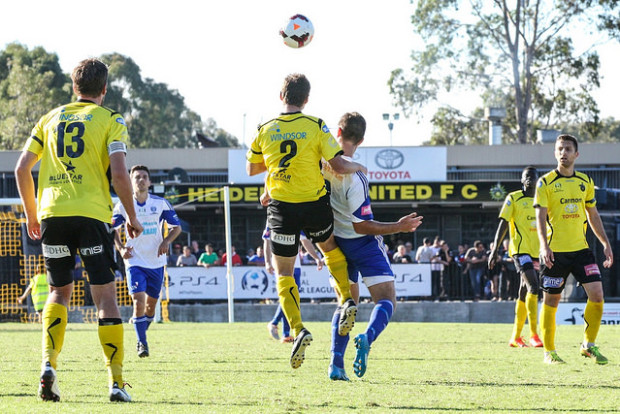

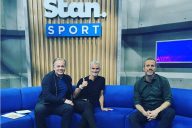
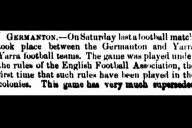
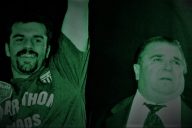

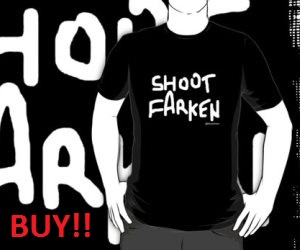









Beautiful post, Engel.
The old folk know what so few of the young ones do; that football (or whatever your tribal passion) is not about victory. Rather, it’s about representation and participation.
As I’ve matured as a fan, I’ve slowly come to realise this.
Thanks for sharing your story with us.
Thanks, Ryan. Much appreciated.
Nice. Local football is a place I feel where the elderly haven’t been left behind. More about community. You walk into some clubs and can feel their values immediately. Old photos and trophies – it puts you in your place and humbles you. Not only that but you can see the hard work put into these clubs and can have an appreciation for the people have done more then they appear capable of.
Feel the same. Thanks for reading and the nice comments.